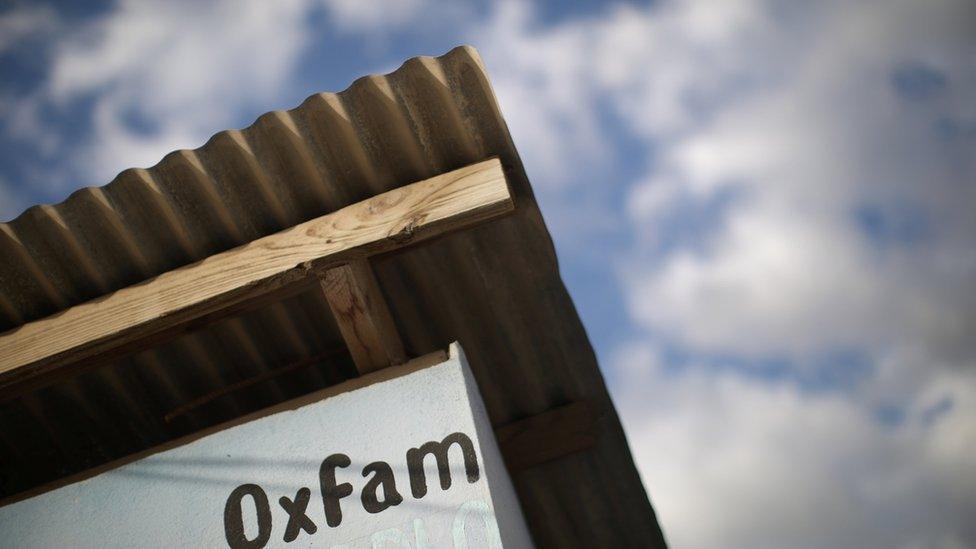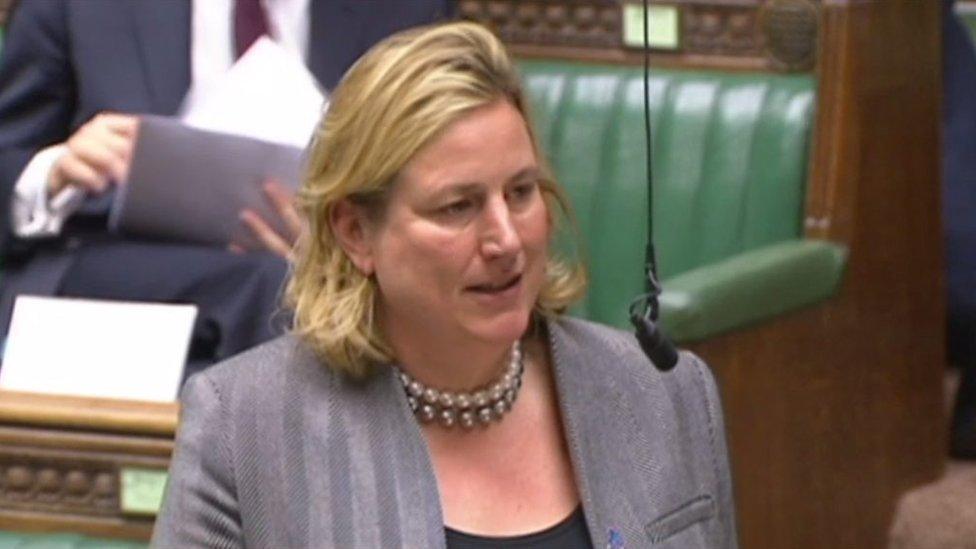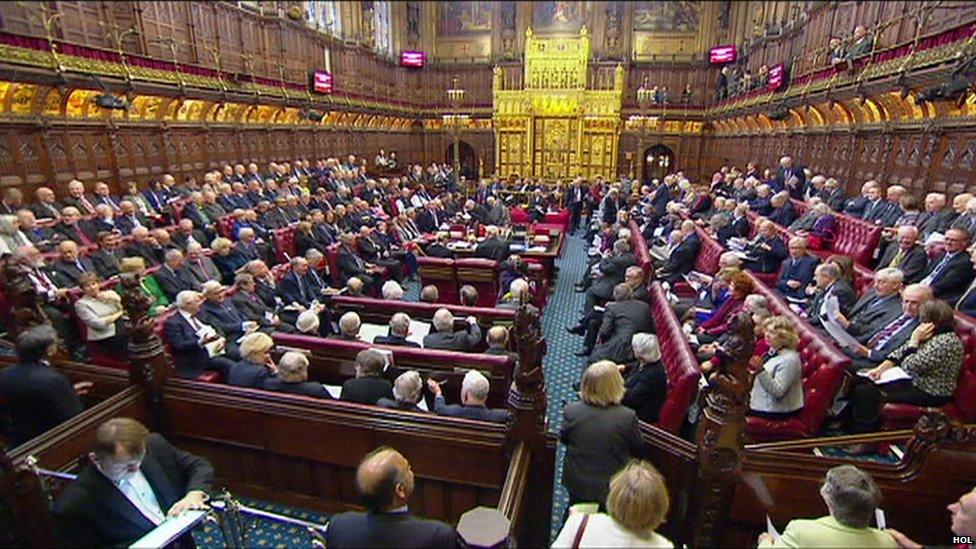Week ahead in Parliament
- Published

MPs are launching an inquiry into alleged sexual exploitation by aid workers.
An eclectic week of Parliamentary action beckons as MPs and peers return, refreshed, from their half-term break. Brexit (but of course!) but also Northern Ireland, Oxfam, Carillion, organ donation, and even basketball, all feature.
Those expecting drama, as the Lords sink their remaining teeth into the detail of the EU (Withdrawal) Bill, should prepare for disappointment. Despite an order paper groaning with amendments, we are still in the preliminary flirtation stage, where issues are aired, ministers tested and coalitions tentatively assembled. It would be a surprise to see anything put to a vote, except as a gesture. An actual government defeat is even less likely.
But there may be other Brexit eruptions. With assorted cabinet ministers due to make speeches about their vision of post-EU Britain, keep an eye out for Commons responses or even urgent questions if they say something really dramatic.
Meanwhile, the effects of the government reshuffle are rippling through committee corridor, with a series of appointments to replace promoted MPs due to be approved by the Commons on Tuesday night.
The most interesting is the former International Development Secretary, Priti Patel, joining the foreign affairs committee - maintaining a strong pro-Brexit voice after the departure of Nadhim Zahawi. Other notable appointments include Anne Marie Morris and Lee Rowley to the Public Accounts Committee (often a training ground for up and coming MPs) and Simon Clarke, who took Middlesbrough South and East Cleveland last year, to the Treasury committee. Will he be a proponent for the Northern Powerhouse?
There are plenty of interesting hearings and some significant reports due out - including the Treasury committee on student loans, and the public administration and constitutional affairs committee on the parliamentary boundary review which is due to be completed in October but which may be blocked by a private members Bill.
Here's my rundown of the week ahead:
Tuesday 20th February
The Commons returns (14:30GMT) with Foreign Office questions after which expect the usual crop of post-break ministerial statements and urgent questions. The Northern Ireland Secretary, Karen Bradley, is expected to make a statement about the failure of talks on restoring devolved government in Northern Ireland.
The day's main debate is the second reading of the Sanctions and Anti-Money Laundering Bill. This is a technical bill to ensure that the UK can continue to meet its international obligations and to implement sanctions and anti-money laundering measures after leaving the European Union.
New legislation is needed because most of the UK's powers to implement sanctions and anti-money laundering measures currently come from the European Communities Act 1972. When that is repealed under the EU (Withdrawal) Bill, new powers will be needed to impose, amend and lift UK sanctions, and to enact anti-money laundering and counterterrorist financing legislation.

MPs will debate whether grassroots basketball is under threat.
In Westminster Hall, proceedings open (09:30) with a 90-minute debate on the future of basketball in the UK, led by the Labour MP Alex Sobel. He believes grassroots basketball is under threat after the loss of funding which followed a disappointing performance at the Olympics.
At 11:00 the SNP's Carol Monaghan raises a controversial medical trial which patients with myalgic encephalomyelitis (ME) say makes them more ill.
When the trial results were published in 2011, researchers claimed that graded exercise therapy (GET) and cognitive behaviour therapy (CBT) were "moderately effective" forms of treatment for the estimated 250,000 ME sufferers in Britain. But the trial has faced intense criticism from patients and charities, such as the ME Association, over how the results were obtained, analysed and presented.
The Liberal Democrat Layla Moran's debate (11.30-13:00) on recruitment and retention of NHS staff in Oxfordshire is a subject with a wider read-across. She wants to highlight cuts to nursing bursaries and continuing professional development, as well as the problems in areas like Oxfordshire with a high cost of living. She will call for a long term recruitment and retention plan across the NHS workforce, covering such issues as key-worker housing.
Later, in a debate on social housing and regeneration in Earls Court and West Kensington (13:30 - 14:30) Labour MP Andy Slaughter will highlight what he says is a classic example of how not to conduct regeneration of social housing. He says a plan to redevelop two estates in the area has hung over 2,000 residents for ten years, before being dropped, because of the state of the housing market.
On the committee corridor, the international development committee has moved fast to organise a hearing (10.30) to question the senior management of Oxfam, Save the Children and the Department for International Development about the scandal over alleged sexual exploitation by aid workers. The first witnesses are Oxfam's CEO, Mark Goldring, and their chair of trustees, Caroline Thomson, who will be questioned about the conduct of Oxfam staff in Haiti, and about the charity's safeguarding policies.
At 11:30, the CEO of Save the Children, Kevin Watkins, will talk about his proposals on safeguarding. Finally, (11:50) the permanent secretary at DFID, Matthew Rycroft, will be asked what his department knew and what steps are being taken.
In the Lords (14:30), the main event is the second reading of the Automated and Electric Vehicles Bill. In the Commons debates on the bill, the key issue was the need for many more charge points for all electric vehicles, not just cars.
Wednesday 21 February
MPs start (11.30) with questions to the Cabinet Office and the Chancellor of the Duchy of Lancaster, followed, at noon by Prime Minister's Question Time.
The day's 10 minute rule bill, from Labour's Tracy Brabin, aims to extend shared parental leave to the self-employed and freelancers. At the moment they miss out on the entitlement to 52 weeks of leave and 39 weeks of statutory pay after their baby is born, which parents on PAYE can split between them.
Her bill would apply to 4.8 million self-employed people - around 15% of the UK workforce. She argues that as increasing numbers of people enter precarious work and the gig economy, employment rights need to catch up with the changes in the world of work. The bill has cross-party support from Maria Miller, the Conservative chair of the women and equalities committee, Labour deputy leader Tom Watson, the Lib Dem Jo Swinson, the Green Caroline Lucas and the SNP's Alison Thewliss.
MPs will then polish off the Finance (No. 2) Bill, which introduces measures announced by the Chancellor in his Autumn Budget, including a stamp duty land tax relief for first-time buyers and measures to crack down on tax avoidance and evasion.

Conservative Antoinette Sandbach is leading a debate on alternatives to a no-deal outcome to Brexit negotiations.
The opening debate in Westminster Hall (09:30-11:00) will be worth watching. It is on "alternatives to a no-deal outcome in negotiations with the EU". It is led by Antoinette Sandbach, one of the Conservative backbenchers pressing the government for a "soft Brexit."
This group seems to be using these debates to air a variety of alternatives to government policy. A debate initiated by another Conservative, Stephen Hammond, on the merits of Britain entering EFTA, gave different Remainer factions a chance to test drive a possible policy option.
This may be another such occasion. Watch out, too, for contributions from the Brexiteer side. The core Brexiteers are only too aware of the potential uses of these debates - an acute sense of how to use procedural devices of this kind was essential to their insurgency during the coalition/Cameron years.
In the afternoon, the Labour MP Eleanor Smith leads a debate 14:30-16:00) on the application of EU employment regulations known as TUPE (Transfer of Undertakings Protection of Employment) to workers at the construction and outsourcing giant, Carillion. Where a company is in liquidation, most of the usual protections provided under TUPE don't apply, so there is no guarantee that existing jobs will transfer to any company which takes over parts of Carillion's sprawling business - which could mean staff face significant changes in terms and conditions.
Next (16:00-16:30) comes a debate on child to parent violence. Labour MP Toby Perkins wants to point out that social work and other systems are configured to deal with violence by adults against children, rather than cases where the child attacks the parent. He has a number of cases from his constituency which illustrate the problem.
My committee pick is the debut before the defence committee of the new Defence Secretary, Gavin Williamson (14:00). In the wake of the committee's toughly-worded report on cuts to the Royal Marines, external which described reductions to the UK's amphibious warfare capability as "a short-sighted, militarily illiterate manoeuvre totally at odds with strategic reality", Mr Williamson can expect a pretty gruelling interrogation.

The House of Lords begins its detailed 'committee stage' scrutiny of the EU Withdrawal Bill
In the Lords (15:00) the day begins with the usual half hour of questions. Then peers embark on a marathon, the first of 10 committee stage days on the European Union (Withdrawal) Bill. For the first three days, the focus will be on Clauses 1-6, which deal with the repeal of the European Communities Act, the legislation which took Britain into the then EEC, and with the retention of existing EU Law.
Labour has a series of amendments related to clause 1 covering health and higher education matters and membership of a couple of key EU programmes - Euratom (the atomic energy cooperation agency), Erasmus (the student exchange programme) and Horizon (the research cooperation programme).
The usual deal on committee stage amendments is that an issue is raised, questions are asked, a minister responds, and the amendment is then withdrawn. There is the possibility that it will be honed in some way, and re-emerge at report stage a few weeks later.
It is rare, but not unheard of, for amendments to be put to a vote at committee stage but many peers regard it as bad form, unless there is some really pressing reason. The anti-Brexit campaigner, Lord Adonis, seems to be fighting the bill every inch of the way. He's given notice that he plans to oppose pretty much every clause, at the "stand part" vote, where peers are invited to approve their inclusion in the bill. There may be 10 committee days scheduled, but I would not care to bet against more being needed.
Thursday 22 February
MPs open (09:30) with international trade questions, followed by women and equalities questions. Then comes the weekly business statement from the Leader of the House, Andrea Leadsom. In recent weeks there has been a trend towards urgent questions and ministerial statements on a Thursday. The government does not seem to mind nibbling into the time available for backbench debates so there may be a few updates from various ministers.
The main debates, chosen by the Backbench Business Committee, are on the role of disabled people in economic growth and on the NHS Cancer Strategy. The latter follows a report , external by the all-party Parliamentary group on cancer, chaired by the Conservative John Baron, which criticised how the strategy was working on the ground.
The joint inquiry into the demise of Carillion, by the Work and Pensions and BEIS Committees continues with evidence from their auditors, Deloitte and KPMG.
In the Lords, from 11:00, the main event is the first of two committee stage days on the detail of the Nuclear Safeguards Bill.
Friday 23rd February
MPs debate two very different, but very significant private members bills (from 09:30) and after a couple of rather consensual Friday sittings, where widely supported bills have been voted through, the Friday Filibuster, with its familiar ritual of endless speeches punctuated by elaborately courteous time-wasting interventions, may well return.
First up is the Labour former minister Geoffrey Robinson's Organ Donation (Deemed Consent) Bill, calling for England to follow the lead of Scotland and Wales and switch to a presumed consent system for organ donation. It would mean people who did not want to donate their organs would have to opt out. This is the kind of issue which could well attract determined resistance from some MPs.
Perhaps even more controversial is the Overseas Electors Bill from the Conservative Glyn Davies, giving expats the right to vote in UK elections regardless of how long they have lived overseas. Current law bars expats from voting in UK elections once they have lived abroad for 15 years. This bill could re-enfranchise an estimated three million 'overseas electors'.
Meanwhile there are also private members bills in play in the Lords (from 10:00). First is the second reading of the Conservative Lord Deben's Ecumenical Marriage Bill, which would allow the solemnisation of marriages in Church of England chapels according to the rites and ceremonies of other Christian denominations. At the moment Catholic priests, Methodist ministers and ministers of other denominations can conduct some services, including funerals and the Mass in C of E premises, but not marriage.
Then comes the second reading of the Family Relationships (Impact Assessment and Targets) Bill, which would require government departments and other public bodies to publish 'family impact assessments' setting out the impact of a policy proposal on families. It would also require ministers to publish objectives and targets for promoting "strong and stable families".
Finally, there is the second reading of the Criminal Records Bill, proposed by the former chief inspector of prisons, Lord Ramsbotham. This would reduce the time it takes for an offender's caution or conviction to become 'spent' under the Rehabilitation of Offenders Act 1974. He says the requirement to disclose offences, even those committed as a child, prevents rehabilitation.